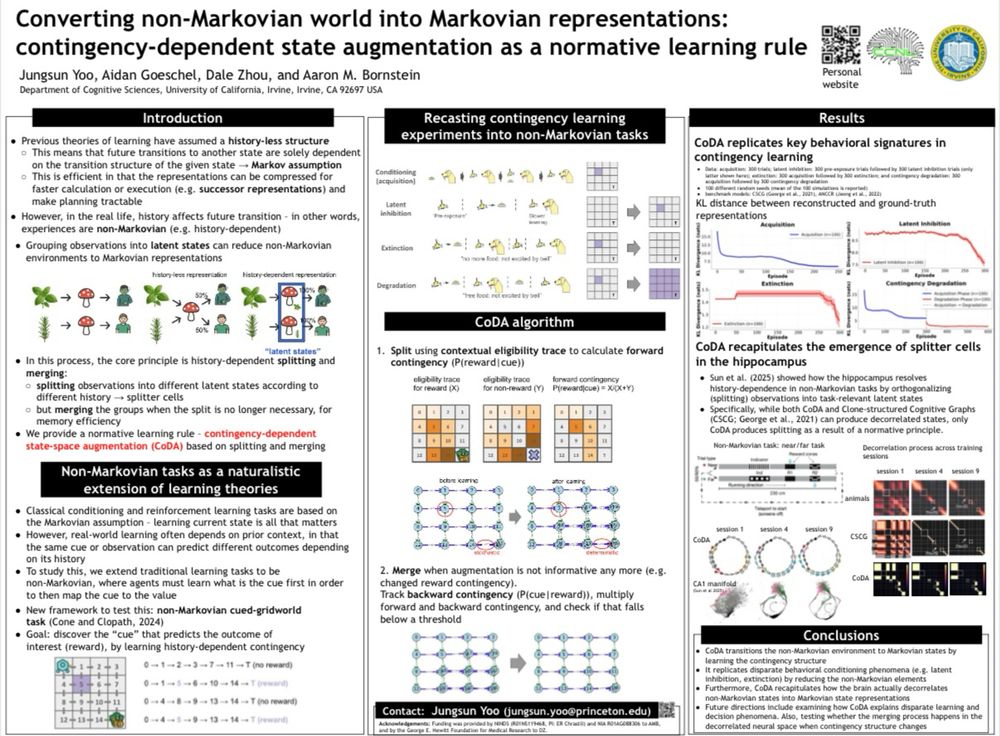🧠 structure learning, metacognition, perception, comp cog neuro.
https://tinyurl.com/rochellekaper
she/her

if you're curious about distinct structure learning & metacognitive dynamics across multiple statistical patterns & stimuli types, come check out my poster w/
@meganakpeters.bsky.social 📈
📍PSTR363.17 / UU13
🕐 Tues Nov 18 1-5 PM
www.abstractsonline.com/pp8/#!/21171...
Cognitive maps are flexible, dynamic, (re)constructed representations
#psychscisky #neuroskyence #cognition #philsky 🧪
Cognitive maps are flexible, dynamic, (re)constructed representations
#psychscisky #neuroskyence #cognition #philsky 🧪
D15 - Naturalistic task framing improves older adults' ability to infer and navigate complex associative networks
by Rohin Palsule, @lovecrabmeat.bsky.social, & @sharonmnoh.bsky.social
www.abstractsonline.com/pp8/#!/21171...
D21 - The impact of learning sequences in encouraging distinct memory representations to support associative inference in older-adults
by @lovecrabmeat.bsky.social, Rohin Palsule, & @sharonmnoh.bsky.social
with @prestonlab.bsky.social
www.abstractsonline.com/pp8/#!/21171...
TODAY! Tuesday 11/18 1-5p
@rochellekaper.bsky.social
PSTR363.17 / UU13 Quantifying the emergence of metacognition in structure learning
www.abstractsonline....
TODAY! Tuesday 11/18 1-5p
@rochellekaper.bsky.social
PSTR363.17 / UU13 Quantifying the emergence of metacognition in structure learning
www.abstractsonline....
if you're curious about distinct structure learning & metacognitive dynamics across multiple statistical patterns & stimuli types, come check out my poster w/
@meganakpeters.bsky.social 📈
📍PSTR363.17 / UU13
🕐 Tues Nov 18 1-5 PM
www.abstractsonline.com/pp8/#!/21171...

if you're curious about distinct structure learning & metacognitive dynamics across multiple statistical patterns & stimuli types, come check out my poster w/
@meganakpeters.bsky.social 📈
📍PSTR363.17 / UU13
🕐 Tues Nov 18 1-5 PM
www.abstractsonline.com/pp8/#!/21171...
stop by to chat learning, memory, (perceptual) decision making, and normative modeling that bridges cross-species and cross-task findings 🧠🐒
w/ @meganakpeters.bsky.social and @aaronbornstein.bsky.social

stop by to chat learning, memory, (perceptual) decision making, and normative modeling that bridges cross-species and cross-task findings 🧠🐒
w/ @meganakpeters.bsky.social and @aaronbornstein.bsky.social
TT2 - Humans adaptively discount successor representations when navigating graph-structured spaces
by Alexa Booras and Theodoros Kapogianis, with @chrastil.bsky.social
www.abstractsonline.com/pp8/#!/21171...
When we learn a category, do we learn the structure of the world, or just where to draw the line? In a cross-species study, we show that humans, rats & mice adapt optimally to changing sensory statistics, yet rely on fundamentally different learning algorithms.
www.biorxiv.org/content/10.1...

When we learn a category, do we learn the structure of the world, or just where to draw the line? In a cross-species study, we show that humans, rats & mice adapt optimally to changing sensory statistics, yet rely on fundamentally different learning algorithms.
www.biorxiv.org/content/10.1...

How easily can working memory create interference in long-term memories? Our new preprint, Interference Across Memory Systems: Disrupting Long-Term Memories Through Working Memory examines this
osf.io/preprints/ps...
w/ @sahcan.bsky.social Anna Lena Mantei, Daniel Schneider
How easily can working memory create interference in long-term memories? Our new preprint, Interference Across Memory Systems: Disrupting Long-Term Memories Through Working Memory examines this
osf.io/preprints/ps...
w/ @sahcan.bsky.social Anna Lena Mantei, Daniel Schneider
@meganakpeters.bsky.social @aaronbornstein.bsky.social

@meganakpeters.bsky.social @aaronbornstein.bsky.social
With great work including @alinatu.bsky.social @mjstarrett.bsky.social @aaronbornstein.bsky.social and more!

With great work including @alinatu.bsky.social @mjstarrett.bsky.social @aaronbornstein.bsky.social and more!
I'll be presenting at SfN's first poster session today in San Diego (Saturday 1pm-5pm).
If you're interested or knowledgeable in human navigation, grid cells, entorhinal cortex, and/or path integration, I'd love to chat with you. (I have questions!)
PSTR043.27 / Board HH12
I'll be presenting at SfN's first poster session today in San Diego (Saturday 1pm-5pm).
If you're interested or knowledgeable in human navigation, grid cells, entorhinal cortex, and/or path integration, I'd love to chat with you. (I have questions!)
PSTR043.27 / Board HH12
- spicy debates in task switching
- using control theory to compare latent dynamical systems fit to RNNs and EEG
eppro02.ativ.me/appinfo.php?...
Stay for the whole ‘Adaptive Choice’ symposium!
- spicy debates in task switching
- using control theory to compare latent dynamical systems fit to RNNs and EEG
eppro02.ativ.me/appinfo.php?...
Stay for the whole ‘Adaptive Choice’ symposium!
We built the Spot The Ball benchmark to test visual social inference – the ability to infer missing information from others’ behavior – in Vision Language Models.
Try the task yourself here: nehabalamurugan.com/spot-the-bal...

We built the Spot The Ball benchmark to test visual social inference – the ability to infer missing information from others’ behavior – in Vision Language Models.
Try the task yourself here: nehabalamurugan.com/spot-the-bal...

Web: www.nature.com/articles/s44...
PDF: rdcu.be/ePxUG

Web: www.nature.com/articles/s44...
PDF: rdcu.be/ePxUG


Nice new article from Liz Crastil's lab explores what factors drive choices of route:
Graph Properties Drive Navigational Selection between Equidistant Routes
www.sciencedirect.com/science/arti...

Nice new article from Liz Crastil's lab explores what factors drive choices of route:
Graph Properties Drive Navigational Selection between Equidistant Routes
www.sciencedirect.com/science/arti...
#doodlebob 🧽


#doodlebob 🧽


